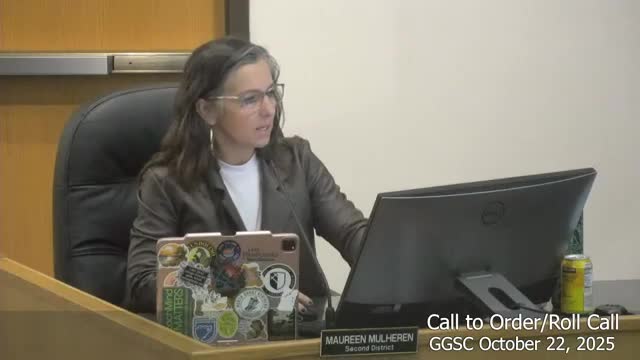Mendocino County committee provides direction on 2026 legislative platform after review of edits
Get AI-powered insights, summaries, and transcripts
Subscribe
Summary
The Mendocino County General Government Committee reviewed and provided direction to staff on the county's draft 2026 legislative platform during its Oct. 22 meeting, after hearing proposed edits and section-specific red lines from county staff and department representatives.
The Mendocino County General Government Committee reviewed and provided direction to staff on the county's draft 2026 legislative platform during its Oct. 22 meeting, after hearing proposed edits and section-specific red lines from county staff and department representatives. The committee voted unanimously to forward the platform, with the requested direction, for consideration by the full Board of Supervisors.
The legislative platform frames Mendocino County's state and federal advocacy priorities for 2026. Kelly Hansen of the County Executive Office told the committee the platform is adopted annually under County Policy 19 and can be updated as needed; she asked the committee to provide red lines and priorities for the draft. "Pursuant to County Policy 19, the Board of Supervisors adopts an annual legislative platform reflecting the County's priorities for legislative advocacy, state and federal funding, and issues of interest to local government," Hansen said. The committee’s action at the meeting was to provide direction to staff and recommend placement of the item for the board's consideration.
Why it matters: the legislative platform informs where county staff and the chair will send advocacy letters and how the county prioritizes asks for state and federal funding. Committee members and department leads flagged items they said warrant clearer language or stronger advocacy, including education and compliance support for cannabis licensees, protections for coastal resources, funding for homelessness programs, and caution in climate-related language to avoid jeopardizing federal grants.
Discussion highlights
- Cannabis: Sarah McBurney of the Mendocino County Cannabis Program presented edits intended to reflect that the county's cannabis program has cleared earlier backlogs and now operates as a regulated licensing department. McBurney said the suggested platform edits emphasize public education and compliance expectations. "We are now through our backlog and really operating as a regulated licensing department ... we're working more towards education of the public and also kind of the expectation of what compliance looks like moving forward," McBurney said. Supervisors asked staff to add more-specific language to seek state support for educating applicants about rights, responsibilities and opportunities in the regulated market, and staff agreed to explore that addition.
- Economic and community development: Committee members discussed restoring an item supporting the Great Redwood Trail after it had been struck from an earlier draft. Staff noted the trail recently received a roughly $50,000,000 promise in the state budget and said the project supports outdoor recreation and local economic development. Committee members also asked staff to include advocacy for low-cost market access for farmers market vendors, continued support for Market Match EBT programs, and language to support microenterprise and home-based business marketing.
- Climate and natural resources language: Hansen said the executive office moderated some climate-related wording so it would not "raise flags with the current administration and jeopardize federal funding for any of the programs that the county currently receives." She emphasized that moderation of language does not indicate a change in the county's priorities but is intended to avoid placing existing federal funding at risk.
- Disaster prevention and recovery: Travis Kilmer, the county's chief recovery and resiliency officer, contributed updated language to emphasize timely reimbursement, insurance reform, and streamlined processes for post-disaster recovery projects.
- Public health and epidemiology: Language relating to COVID-19 preparedness and epidemiological services was moved into the public health section to reflect planning for future epidemics rather than a separate COVID-specific item.
- Behavioral health and jail: The committee discussed a redline that had removed a specific request for state funding for the behavioral health wing of the new jail. Committee members noted the facility is expected to be completed in 2026 and that staffing needs may still warrant advocacy; staff said the board may choose to revise the language to request assistance for staffing rather than construction costs.
- Housing and homelessness: Staff added language reflecting department feedback to support flexibility in the Homeless Housing, Assistance and Prevention (HAP) grant and to continue advocating for HUD rental subsidy programs. Committee members noted uncertainty around future HAP rounds and funding structure.
Formal actions and votes
1) Motion to provide direction to staff on the draft 2026 legislative platform and recommend placing the item for future Board of Supervisors consideration. The committee recorded a roll-call vote and approved the motion unanimously. The minutes reflect Chair Mulherin and Member Norvell voting "yes"; the clerk announced, "The motion carries unanimously." The committee's recorded action was to provide direction; staff will incorporate the committee's red lines and bring the revised platform to the full board for consideration.
2) Approval of minutes from the June 25, 2025 regular meeting. The committee approved the minutes by unanimous roll-call vote.
What the committee did not decide
The committee provided direction but did not adopt a final platform at the meeting. Several section-specific items — including the exact language on Great Redwood Trail advocacy, any new, specific ask for state support of the behavioral health wing staffing, and the scope of a cannabis-education request to the state — were left for staff to refine and return to the board.
Meeting context and next steps
Kelly Hansen said the legislative platform is a standing board item and can be updated; staff will incorporate the committee's direction and return the draft to the Board of Supervisors for formal consideration. The meeting ran about 28 minutes and included presentations from Executive Office staff and departmental leads on the proposed edits.
Quotes in this article come from speakers who addressed the General Government Committee during the Oct. 22 discussion and are attributed to those individuals in the body of the article.
